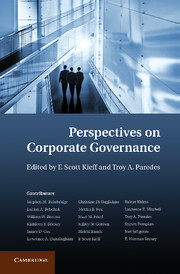Book contents
- Frontmatter
- Contents
- Contributors
- Acknowledgments and Dedication
- PERSPECTIVES ON CORPORATE GOVERNANCE
- Introduction
- PART ONE THE BOARD OF DIRECTORS AND THE CEO
- PART TWO THE WHY, WHEN, HOW, AND HOW MUCH OF EXECUTIVE PAY
- 4 Pay Without Performance: Overview of the Issues
- 5 Supersize Pay, Incentive Compatibility, and the Volatile Shareholder Interest
- 6 “Say on Pay”: Cautionary Notes on the U.K. Experience and the Case for Muddling Through
- PART THREE CONSTRAINING MANAGERS AND DIRECTORS: INVESTORS, SECURITIES REGULATION, AND THE MEDIA
- PART FOUR DELAWARE VERSUS CONGRESS: ON THE FEDERALIZATION OF CORPORATE GOVERNANCE
- PART FIVE COMPARATIVE CORPORATE GOVERNANCE
- Epilogue: Three Secular Trends of Corporate Law
- Index
- References
4 - Pay Without Performance: Overview of the Issues
Published online by Cambridge University Press: 04 August 2010
- Frontmatter
- Contents
- Contributors
- Acknowledgments and Dedication
- PERSPECTIVES ON CORPORATE GOVERNANCE
- Introduction
- PART ONE THE BOARD OF DIRECTORS AND THE CEO
- PART TWO THE WHY, WHEN, HOW, AND HOW MUCH OF EXECUTIVE PAY
- 4 Pay Without Performance: Overview of the Issues
- 5 Supersize Pay, Incentive Compatibility, and the Volatile Shareholder Interest
- 6 “Say on Pay”: Cautionary Notes on the U.K. Experience and the Case for Muddling Through
- PART THREE CONSTRAINING MANAGERS AND DIRECTORS: INVESTORS, SECURITIES REGULATION, AND THE MEDIA
- PART FOUR DELAWARE VERSUS CONGRESS: ON THE FEDERALIZATION OF CORPORATE GOVERNANCE
- PART FIVE COMPARATIVE CORPORATE GOVERNANCE
- Epilogue: Three Secular Trends of Corporate Law
- Index
- References
Summary
INTRODUCTION
In our recent book Pay without Performance, and in several accompanying and subsequent papers, we seek to provide a full account of how managerial power and influence have shaped executive compensation in publicly traded U.S. companies. Financial economists studying executive compensation have typically assumed that pay arrangements are produced by arm's-length contracting, contracting between executives attempting to get the best possible deal for themselves, and boards trying to get the best possible deal for shareholders. This assumption has also been the basis for the corporate law rules governing the subject. We aim to show, however, that the pay-setting process in U.S. public companies has strayed far from the arm's-length model.
Our analysis indicates that managerial power has played a key role in shaping executive pay. The pervasive role of managerial power can explain much of the contemporary landscape of executive compensation, including practices and patterns that have long puzzled financial economists. We also show that managerial influence over the design of pay arrangements has produced considerable distortions in these arrangements, resulting in costs to investors and the economy. This influence has led to compensation schemes that weaken managers' incentives to increase firm value and even create incentives to take actions that reduce long-term firm value.
The dramatic rise in CEO pay during the past two decades has been the subject of much public criticism, which intensified following the corporate governance scandals that began erupting in late 2001.
- Type
- Chapter
- Information
- Perspectives on Corporate Governance , pp. 117 - 149Publisher: Cambridge University PressPrint publication year: 2010
References
- 1
- Cited by



